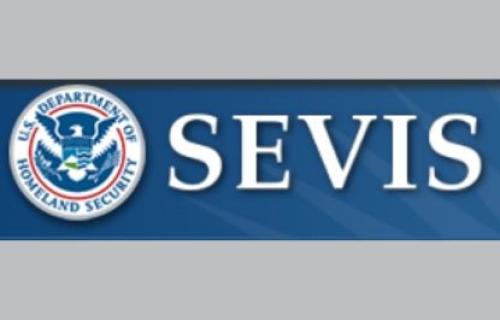Immigration Documents
On This Page
- Passport
- Visa
- I-20 (F-1 Students and their Dependents Only)
- DS-2019 (J Exchange Visitors Only)
- I-797 (Scholars Only)
- I-94
- Port of Entry Stamp
- SEVIS I-901 Receipt (F-1 and J-1s Only)
- SEVIS
US law requires international students, scholars and their dependents to provide valid immigration documents when entering the United States. These documents should be kept up to date and in a student/scholar/dependent's possession at all times. ISSS recommends that Emory's international community members carry copies of their documents with them while in the Atlanta area and original documents when traveling outside Atlanta. Original immigration documents must be presented when returning to the US after traveling internationally. For more information on travel within the US and abroad, visit ISSS' Travel page.
Any time an international student or scholar receives a new immigration document (e.g. new I-94, a new visa sticker, etc.), they should be sure to upload it to ISSS Link by completing the Submit New Document form.
Passport
The passport is a government's permit allowing an individual to leave and re-enter their home country. International students/scholars/dependents should ensure that their passport is valid six months into the future at all times. To renew from within the United States, it is recommended students/scholars contact their local embassy. Students who need to supply a letter affirming that they are enrolled at Emory University can request an official letter from the Office of the Registrar. The passport contains the following information:
A. Identifying photo
B. Passport number
C. Full legal name
D. Date of birth
E. Issuance and expiration date, during which time it is valid
F. Machine-Readable Zone (MRZ)
*A passport can also contain visas permits that may have been granted and/or port of entry stamps from countries the individual has entered.
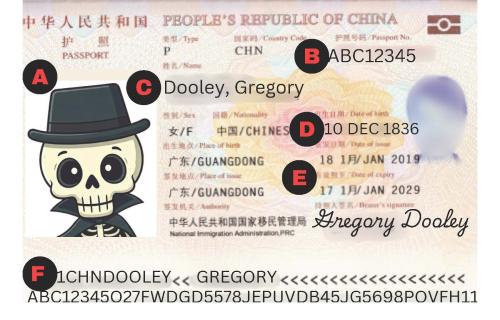
Visa
A US visa (stamp or sticker) is an endorsement placed in a passport by a US embassy or consulate abroad which provides permission to travel to a US port of entry and request admission to the US.
Once an individual enters the US, their visa stamp can expire without affecting their legal stay – as long as they have a valid immigration document (e.g. I-20, DS-2019 or I-797) and a valid I-94. If a student or scholar's visa has expired and they are planning to travel outside the US, they'll need to renew the visa. F-1 and J-1 visas cannot be renewed from within the US.
The visa contains the following information:
A. Identifying information to match the passport's photo ID page (name, birthdate, passport number, etc.)
B. Type or class (F-1, J-1, H-1B, etc.) in which the student/scholar/dependent plans to enter the US
C. Number of times the individual is permitted to request entry to the US with a particular visa (multiple or single)
D. Visa expiration date
E. The name of the institution a student will attend or the name of the institution at which a scholar/employee will work
F. Notification of whether or not an individual will be subject to other immigration regulations (e.g., 212(e), the two-year home-residency requirement)
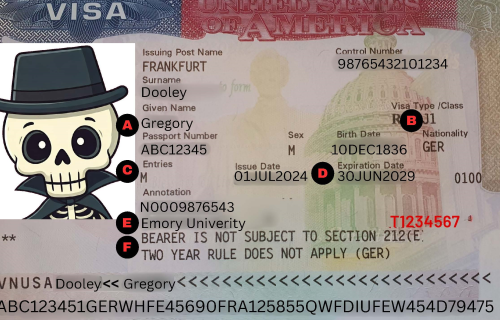
I-20 (F-1 Students and their Dependents Only)
The Certificate of Eligibility, Form I-20, is a multi-purpose government form produced in SEVIS. It is used in connection with many F-1 procedures and benefits. It is required as a part of the visa application process. Along with a valid F-1 or F-2 visa, the I-20 is used by F-1 students and their F-2 dependents when entering the US. F-1 students must keep their I-20 up to date and should let their ISSS advisor know about any changes. Prior to traveling abroad, students must submit the Travel Information Update form in ISSS Link so that ISSS can determine if the student requires a travel signature or any other I-20 update (major, funding, etc.).
Visit ISSS' Understanding the I-20/DS-2019 page for a detailed I-20 explanation and full-sized images of page one and two.
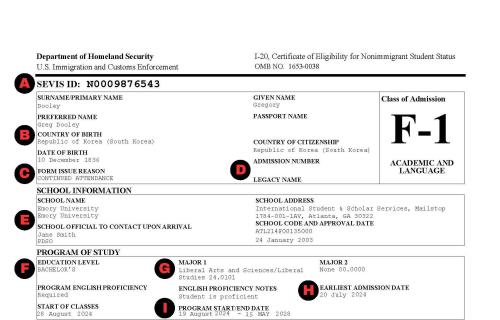
DS-2019 (J Exchange Visitors Only)
The Certificate of Eligibility, Form DS-2019, is a multi-purpose government form produced in SEVIS. It is used in connection with many J-1 procedures and benefits. It is required as a part of the visa application process. Along with a valid J-1 or J-2 visa, the DS-2019 is used by J-1 exchange visitors and their J-2 dependents when entering the US. Exchange visitors must keep their DS-2019 up to date and should let their ISSS advisor know about any changes. Prior to traveling abroad, exchange visitors must submit the Travel Information Update form in ISSS Link so that ISSS can determine if the exchange visitor requires a travel validation or any other DS-2019 update.
For a detailed explanation and a full sized image of the DS-2019, visit one of the following pages:
Students: Understanding the I-20/DS-2019
Scholars: Understanding Immigration Documents
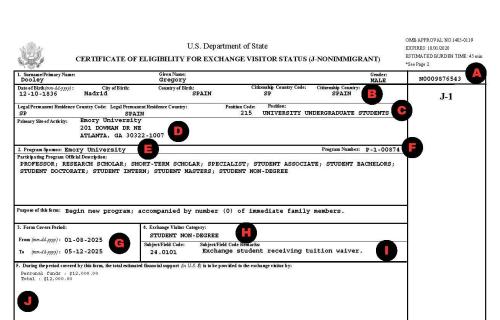
I-797 (Scholars Only)
Emory international scholars will receive an I-797 approval notice after USCIS has approved a petition in which Emory University acts as the petitioner and the scholar is the beneficiary. All H-1B and O-1 scholars will be issued an I-797, but it is rare for TN and E-3 scholars to receive this document as a petition to USCIS is not always required for individuals to obtain TN or E-3 status. If issued an I-797, the scholar will use the approval notice along with their visa to enter the US. Scholars must keep their I-797 up to date and should let their ISSS advisor know about any changes.
Visit ISSS' Understanding Immigration Documents page for a detailed I-797 explanation and full-sized images of two I-797 approval notice types (consular notification and change of status).
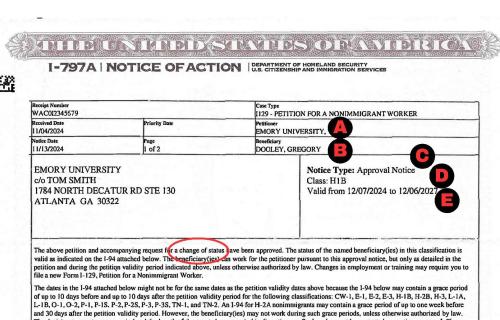
I-94
The I-94 arrival/departure record is the official immigration document that confirms an individual’s current immigration status (proof of immigration registration). A new I-94 is issued when individual enters or re-enters the US and contains information from their most recent entry. The US government requires nonimmigrants over the age of 18 to carry a copy of their I-94 with them at all times while in the US. Even if someone is younger than 18, it would be prudent to carry an I-94 copy.
Most nonimmigrants will be issued an electronic I-94. Paper I-94s are only issued in special circumstances. Individuals can download, save and print a copy of their electronic I-94 from CBP's I-94 website.
After each entry to the US, it is recommended that students/scholars/dependents verify that all information on the I-94 is accurate. If there are errors, they should contact ISSS right away so ISSS can help get them get the I-94 corrected, if possible.
A. Admission Record Number/I-94 Number
B. Nonimmigrant status into which the student/scholar/dependent was admitted
C. Date by which the person must depart the US (when their status ends). Rather than having a date specific I-94, Fs and Js will have "D/S" which stands for "Duration of Status."
D. Biographical information
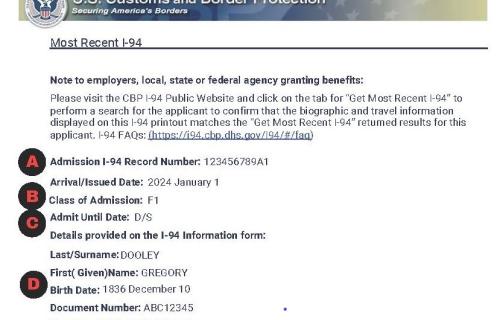
Port of Entry Stamp
Depending on the US port of entry, an international student/scholar/dependent may be issued a port of entry stamp. In general, the practice of stamping a passport each time an individual enters the US is being phased out. For example, immigration officers at the Atlanta airport are no longer providing these stamps, so there is no need to worry if a stamp is not issued. If a port of entry stamp is issued, it will likely be placed on the page next to the visa and contain the following:
A. Location of entry point
B. Date of entry
C. Class of entry (F-1, J-1, H-1B, etc.)
D. Length of stay (usually "D/S" (duration of status) if obtaining F or J status or a specific date for H-1B, E-3, O-1, or TN scholars).
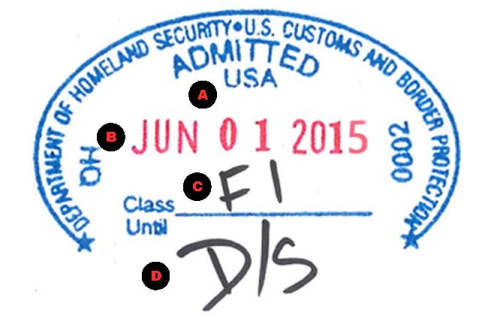
SEVIS I-901 Receipt (F-1s and J-1s only)
This document is issued by the Student and Exchange Visitor Program when a student or exchange visitor pays their SEVIS fee. Students and scholars will be asked to present this receipt at both their visa application interview and at the port of entry. After receiving their I-901 receipt, students and scholars should check that their personal information matches the information on their other documents. The I-901 contains the following information:
A. Nonimmigrant visa status (F-1 or J-1)
B. F-1 School Code (Emory: ATL214F00135000) or J-1 Program Code (Emory: P-1-00874)
C. SEVIS Identification Number
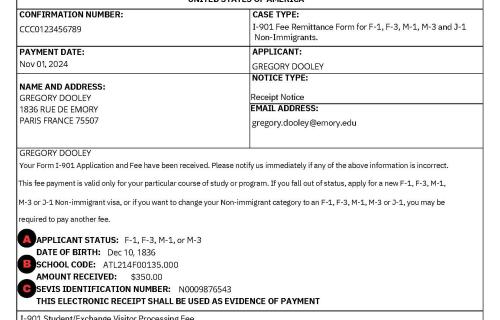
SEVIS
SEVIS (Student and Exchange Visitor Information System) is an internet-based system operated by the US Department of Homeland Security that tracks and monitors international students and exchange visitors who enter the United States in F, M, and J immigration categories.
Educational institutions and exchange visitor program sponsors must use SEVIS to issue the forms required for visa applications (Form I-20 for F students and DS-2019 for J exchange visitors). SEVIS is also used by schools and program sponsors to report government-mandated information or events such as enrollment, address changes, program extensions, employment authorizations and violations of status.
Institutions enrolling international students in the US must utilize the SEVIS system and be SEVP-certified to issue I-20 or DS-2019 forms. The use of SEVIS is not unique to Emory University.
